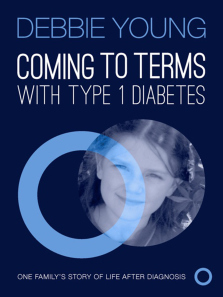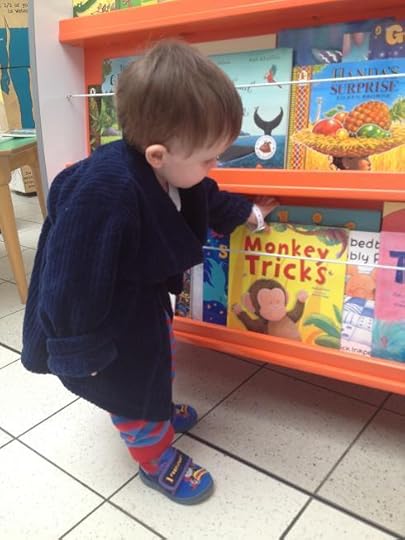Debbie Young's Blog, page 55
March 31, 2014
En Panne in De Panne – The Tale of our Belgian Breakdown
“Have red shoes, will travel” – outside a wine shop in Sancerre in our 2011 French tour
A post about the night our camper van blew a tyre on a Belgian motorway, near the coastal resort of De Panne, Belgium
When travelling, I try to go native, as far as my natural English reserve will allow. The very least I do is to try to eat and drink what the locals are having. Bath buns in Bath, drinking Sancerre in Sancerre – what’s not to love about those destinations?
But in some cases I’d prefer to make an exception, as in our February 2014 trip in our small motorhome to France, Belgium and the Netherlands.
We’d just spent a lovely afternoon at Plopsaland (yes, it is a real place – see this earlier post), in the pleasant Belgian coastal town of De Panne. If you’re wondering why the name De Panne sounds familiar, it’s because of its similarity to the French phrase for being in the state of automotive breakdown: en panne.
Camper Van Crisis
We’re bowling away from De Panne in the direction of Antwerp when my husband, at the steering wheel, starts emitting anguished noises nearly as loud as the sounds emanating from our back axle. When the rear right wheel starts to sound like a tank crossing cobblestones, Gordon pulls over onto the hard shoulder.
“We’ve got a flat tyre,” he surmises, stony-faced.
Cars and lorries are hurtling past us in the pitch black, terrifyingly close. It begins to rain.
My heart sinks. As Gordon scrabbles in his wallet for his rescue service membership card, I search for the paraphernalia that drivers are required to carry on the continent.
Don’t drive through France without it (photo via Amazon)
I’m astonished and relieved to discover that we do have on board the reflective triangle which must be placed 50-100m behind any vehicle in case of breakdown, plus the requisite dayglo waistcoat, which Gordon dons before marching into oncoming traffic to set up the triangle.
While he does so, I unearth the spare set of bulbs, the headlight adapters and the breathalyser, in the absence of which we would face a police charge. I’m impressed. We’re not normally this organised (and yes, I do realise that strictly speaking the headlight adapters ought to be on the headlights, not in a cupboard).
A Tale of Previous Panic
Innocents abroad – spot the tourists in Fontainebleau, summer 2011
Gordon is keen to avoid a recurrence of our previous near-arrest by French traffic police on an earlier trip.
They pulled us over in a small town on a sleepy summer Saturday afternoon, after we’d gone twice round a roundabout trying to find the local swimming pool to cool off. They asked to see our papers for the van. The papers were still in England.
While apologising profusely for their absence in my best schoolgirl French, I glanced over my shoulder to check that Laura, then aged 7, was not frightened at this turn of events. She flashed her sweetest smile at the policemen from where she sat surrounded by cuddly toys, and the gendarmes‘ hearts melted.
A swift discussion ensued between the policemen, in which I detected that they were going to change their incident notes. They’d skip the bit about the missing papers and say they’d stopped us to check the child in the back was wearing a seatbelt. She was. We were off the hook – and they even told us how to get to the swimming pool.
Back in De Panne in de present, I’m relieved to realise that our overseas rescue membership must still be valid, as it’s less than a year since we called them out in Luxembourg, when we renewed our card.
International Rescue
Our knight of the road
I keep to myself the knowledge that, in the UK at least, for safety reasons it’s deemed best practice to leave the distressed vehicle and sit on the hard shoulder until the rescue vehicle arrives. We might in theory be safer perched on a precipitous grassy bank in the dark and in the rain, but I feel more secure remaining in the van, with the lights on, rustling up a cup of tea and a meal on the gas stove.
We are not waiting long. A Belgian rescue mechanic arrives within the hour, cheerful, friendly and efficient. Ten minutes later, he’s replaced the burst tyre with the spare wheel. He advises us to drive slowly to the next aire (motorway services), conveniently just 700m ahead, to inflate the spare tyre to the legal standard. To make sure we arrive intact, he leads the way in his bright yellow van and helps us find the air hose, parking his van protectively alongside us, like a mother hen on wheels.
It’s only then that I notice on the side of his vehicle the declaration of the service that he offers: “Dépannage”. So, we have been dépanné in De Panne. That’s rather pleasing.
(Cover of 1974 single – image via Amazon.co.uk)
All the same, as he pulls away into the night, I make a mental note never to visit Shanghai.
Read more about another incident of depannage and other vehicle-related misadventures here
Nous Sommes En Panne (the tale of a Luxembourg camper van crisis)
Lost in France (in which I fail abysmally to go native in Senlis)
(a light-bulb moment at a French roadside)
Filed under: Belgium & Netherlands Feb 2014, Belgium & Netherlands February 2014, France, motoring, travel Tagged: antwerp, Bath buns, Belgium, burst tyre, camper van, De Panne, en panne, French traffic police, motorhome, Plopsaland, Sancerre, Shanghai'd in Shanghai, travel, travels with my camper van, vehicle breakdown

March 28, 2014
Branching Out from Books
An update about one of my freelance writing projects For the last year or so, I’ve been writing a regular column for a British online parenting magazine called Kideeko (www.kideeko.co.uk). I first became involved with Kideeko when I was still working part-time at the children’s reading charity Read for Good. At first, I was writing exclusively about children’s books and reading, fuelled by the knowledge and experience I’d gained through my work at Read for Good, and these articles provided a valuable opportunity to raise awareness before a family audience of Read for Good’s excellent work. For those of you who don’t already know, Read for Good is a UK national charity which exists to promote reading for pleasure among children. There are two distinct parts to the charity, which is funded entirely by donations (it’s easy to donate online via their websites):
Readathon, which provides schools with free materials to runs sponsored reading schemes in thousands of schools all over the country, at any time
ReadWell, which takes free books and storytellers into children’s hospitals to make life better for young patients, their families and their carers
In the three and a half years that I worked for Read for Good, I learned what I had already known instinctively: that books change lives for the better, in all kinds of ways.
Growing Up With Books
An early indication of my love of books: enthusiastic colouring
My own life experience endorses that view. I was a lucky child: I was brought up in a house full of books, taken on regular visits to the local public library and had my own bookshelves in my bedroom. Books were valued and reading always encouraged. Whether sharing books with other members of the family, listening to stories on the radio or on vinyl records (no CDs or iPods in those days!), or reading alone, I grew up loving books. It was no surprise to anyone when I chose English Literature for my degree, or when my career revolved around writing, at first under the guise of trade press hack and PR consultant, and latterly as a published author, journalist and blogger. Although Kideeko’s editor has now asked me to address broader parenting topics, the joys of children’s books and reading are never far from my mind whenever I’m writing about children. (I also write for Today’s Child Magazine, available in print and online.) For evidence, you have only to read my article about Mother’s Day in Kideeko‘s March issue, in which I hark back to treasured moments sharing books and stories with my mum. You can read that column here: Making Mother’s Day
An 80th birthday hug from her granddaughter in a Christmas onesie
In the meantime, I’m looking forward to sharing Mother’s Day with my child, as well as my mum, this Sunday, and I wish a happy Mother’s Day to mothers everywhere. If you’d like to read more about my lovely mum and daughter, here are some past posts about them: The Scent of a Mummy - remembering my grandmothers’ and mother’s perfumes The Only Certainties in Life: Birthdays and Taxes – celebrating my mum’s 80th birthday Father’s Day To Follow – my daughter’s take on such celebrations
Filed under: charities, daughter, family, grandparents, Life With Books, lifestyle, mother, nostalgia, Read for Good, reading, writing Tagged: benefits of reading, children's books, Kideeko, Mother's Day, motherhood, parenting, Read for Good, Readathon, reading, ReadWell

March 27, 2014
International Friendships & Chance Meetings Online
 A post about making new friends and keeping old friends all over the world via the internet
A post about making new friends and keeping old friends all over the world via the internet
As the former pupil of an international school, one of the reasons I love the internet is that it has enabled us to reconnect, decades later, wherever we now live.
I spent four of my teenage years at Frankfurt International School (FIS), which in those days was attended by children of around 60 nationalities. Not only did I make friends from countries I’d never visited, I even discovered some new countries that I’d never heard of, and some, in those Iron-Curtained days,which didn’t even officially exist. Yes, Estonia, I’m talking about you. Kudos to Paul who in the school yearbook stated his nationality as Estonian, even though I suspect his passport was either American or Russian.You can take the boy out of Estonia, but…
I asserted my own national status equally proudly, retaining my British accent when my few fellow countrymen in the school acquired the American twang dominated the classrooms. All lessons were officially taught in English, apart from French and German.
Opening International Doors
As valedictorian at the 1978 FIS graduation ceremony: “And in 30 years time, I’ll come back and tell you how I became a writer”
Despite spending most of my first 14 years in a sheltered London suburbia (Sidcup, to be precise), passing the next four years in an international community made it second nature, once the internet had been invented, for me to make new international friendships online, as well as renewing old connections from my schooldays.
I get a particular thrill when friends from different parts of my past hook up with each other online, such as a Becky, former neighbour befriending Janet, a past Californian classmate, and Katherine, a Sidcup schoolmate meeting – yes, meeting in real life – Jacky, a newer friend from recent years. They’d got into conversation while replying to my Facebook posts and something just clicked between them, if you’ll excuse the IT pun.
I now look out for and encourage such connections, loving the feeling that the internet is turning the world into a village. As an optimist, I prefer that rosy view to the more cynical notion that the internet’s turning global citizens into international spies. (Don’t get me started about Google Earth…)
Publishing Connections
Decades after leaving school, my career and family developments have caused me to join many new networks. Occasionally these also spark serendipitous connections. Just lately, in my role of commissioning editor of The Alliance of Independent Authors’ blog, I was pleased to receive a request from Christine Frost, a self-published author who’d written a blog post for me about the Boston Book Festival. She now invited me to write for the website of a US-based online community called GLU aimed at those affected by Type 1 diabetes.

March 19, 2014
How I Came To Write for ALCS News
 I have to thank Hereward Corbett, proprietor of the equally wonderfully named Yellow-Lighted Bookshops in Nailsworth and Tetbury, for his personal introduction to Caroline Sanderson, editor of the ALCS News.
I have to thank Hereward Corbett, proprietor of the equally wonderfully named Yellow-Lighted Bookshops in Nailsworth and Tetbury, for his personal introduction to Caroline Sanderson, editor of the ALCS News.
I thought I was busy till I met Caroline. Not only is she newsletter editor for the ALCS, she’s also non-fiction editor for The Bookseller (the trade paper of the British book trade), chair of literary festival events, book award judge, and a respected author – and she still finds time to volunteer in the local community, choreographing a fabulous Book Week for one lucky primary school in the neighbourhood.
A meeting with Caroline in one of my favourite coffee shops, The Olive Tree in Nailsworth. resulted in her commissioning me to write this overview of self-publishing in the March issue of ALCS. (The best author meetings happen in coffee shops, something I blogged about here.)
So what’s ALCS? I hear you cry
 The organisation’s full name is the Authors’ Licensing and Collecting Society. This marvellous membership organisation for authors is much-loved by writers of all kinds because it looks after their rights and ensures they receive fair payment for the various uses of their work. To join costs just £25 a year, and in return members receive a regular income stream in addition to the earnings received directly from their writing (advances, royalties, etc).
The organisation’s full name is the Authors’ Licensing and Collecting Society. This marvellous membership organisation for authors is much-loved by writers of all kinds because it looks after their rights and ensures they receive fair payment for the various uses of their work. To join costs just £25 a year, and in return members receive a regular income stream in addition to the earnings received directly from their writing (advances, royalties, etc).
The ALCS News is issued monthly online to keep authors abreast of developments affecting their rights and earnings.
Caroline asked me to write about self-publishing to raise awareness of its potential as a further source of income for members. My brief was to help ALCS members make informed decisions about whether or not to self-publish any of their work.
The reason Caroline asked me to do this is because I am more or less her counterpart within the Alliance of Independent Authors, for whom I edit a blog of self-publishing advice.
And ALLi….?
The Alliance of Independent Authors is the professional, non-profit organisation for self-publishing authors. Not surprisingly, there is a significant overlap between our membership groups. As time goes by, I’m hoping that overlap will increase. I should point out that ALCS is a UK organisation, and ALLi’s membership is worldwide, but there are equivalent organisations fulfilling ALCS’s functions all over the world.
How wonderful – and appropriate – that such a quest was kicked off in our local indie bookshop! There’s so much more to bookshops than just books. Use them or lose them, folks!
To read my article about self-publishing in the March issue of ALCS News, please click here.
For More Information
To find out more about the ALCS, and to join it for just £25 for life, visit its website: www.alcs.co.uk
To find out more about ALLi, visit the member website, go to www.allianceindependentauthors.org
To read ALLi’s blog, edited by me, head over to: www.selfpublishingadvice.org
And, if you’re in striking distance of Nailsworth or Tetbury, make time to visit either branch of The Yellow-Lighted Bookshop – you’ll be glad you did!
To keep up to date with news about my writing life, and for advance notice of new publications, events and special offers, click the “Join My Mailing List” link in the column to the right of this post.
Filed under: blogging, self-publishing, writing Tagged: ALCS, ALCS News, ALLi, Alliance of Independent Authors, authors' rights, Caroline Sanderson, copyright, Debbie Young

March 14, 2014
Why I Read And Review Books Beyond My Comfort Zone
Some thoughts on reading habits and book reviews
If there were a prize for the least obvious book cover image, I think this would get my vote.
In the last 48 hours, I’ve stepped way outside my reading comfort zone.
As a frequent book reviewer, I’m often asked to consider books that I’d never choose in a bookshop or library – unlike the Ladybird book pictured here, which I snapped up in a secondhand bookshop the other day for the sake of its bizarre cover, and because I adore vintage Ladybird books.
Sometimes the publications I review for send me copies of books they particularly want me to consider, other times authors or publicists approach me on spec, after finding my name on Amazon’s list of top reviewers.
Admittedly they have to trawl for quite a long way to reach me, as I’m currently ranked around the 1,400 mark. If they’ve got that far, I so admire their staying power that I’m likely to agree to their request for a review, provided they ask me nicely. There’s nothing that hacks off a book reviewer as much as an author’s assumption that sending you a free book entitles them to a review. Except authors who do that and then reel off a long list of sites on which they expect you to post your review, including some that you’ve never even visited.
Why I Review Books
I love book reviewing. For one thing, it prevents me from slipping into a cosy habit of rereading old favourites and their clones. It’s too easy to treat book buying like clothes shopping, being drawn like a magnet to those you already know and love. (And I really don’t need to buy any more knee length boots, denim jackets or cordoruoy leggings.)
I therefore made it my policy long ago to keep an open mind about review requests, turning down only anything featuring violence or unnecessary tragedy.
Two New Reading Experiences in One Day

Polish poetry – click the image to read my review
So it happened today that I found myself reviewing both a YA (young adult) steampunk thriller (sent to me by the debut author) and a collection of Polish poetry in translation (received from Vine Leaves Literary Journal, for which I’m a staff reviewer).
Now, I have a lot of books in my house, including a floor-to-ceiling to-read bookcase in my bedroom. But until this week I didn’t possess a single steampunk thriller or Polish poem. In fact I only recently worked out what steampunk is. (If you don’t know either, check out the Urban Dictionary’s definition here). Although I enjoy poetry, and still treasure some of the poetry books I had from school and university, I’m not sure I’ve ever knowingly read a Polish poem.
But what a joy these books have been to read, filling my imagination with new adventures and images, and changing the way I look at the world, just a little, as every good book should. It was also satisfying to write their reviews. Formulating a book review always helps me mentally digest what I’ve read. By doing so, I extract far more pleasure than if I’d just closed each book on finishing and moved on to the next one in my to-read pile without any further thought.
How To Make An Author Happy
I also gain pleasure from knowing that the book’s authors will appreciate my response. As an author myself, I know the warm glow that comes from spotting a new review of one of your books.

Click on the cover of the YA steampunk thriller to read my review on Amazon UK
Strangely, in the time it’s taken me to read and review those two books, two more new reviews have come in for one of my own books (Sell Your Books!, now with 42 reviews on Amazon UK, average rating 4.6*)) – not from the authors of the books I reviewed, but from two completely different readers. Is there some kind of book reviewer’s karma at work? To any writer who also reads books (as all writers should), that’s got to be a comforting thought.
Whatever you’re reading just now, if you enjoy the book, take a moment to thank the author by leaving a quick review on Amazon, Goodreads, or any other site that you prefer. I guarantee you’ll make the author’s day.
If you liked this post, you might like these others about books and reading:
All Booked Up For World Book Day
Radio Interview About Books for Cheltenham Literary Festival
The Unusual Souvenirs of Camper Van Travel
Filed under: blogging, book reviews, creativity, reading Tagged: Amazon, book reviews, books, comfort zone, Death on the Empress, Goodreads, Joanna Kurowska, Polish poetry, reading, reviewing, steampunk, Stuart Harper, The Wall and Beyond, top reviewers, Vine Leaves Literary Journal

March 12, 2014
Plopsaland – It’s Nicer Than It Sounds!
The next instalment about our half-term trip to France, Belgium and Luxembourg, focusing on the delightfully-named Belgian theme park Plopsaland
Getting ready for a bee’s eye view
“Plopsaland – it’s not just about toilets!”
As we tour this amusement park near the Belgian seaside town of De Panne, I’m trying to devise a slogan that will do it justice, unlike its name, which sounds less than alluring to the English speaker’s ear.
Putting Flemish first
Plopsaland is defiantly Belgian. Its directional signs are all in Flemish, with a less prominent French translation. There is not a word of English in sight – but why should there be? The polyglots of Disneyland have given us English an inflated idea of the importance of our native tongue.
Meet Maya
It seems Plopsaland doesn’t especially welcome the French speaker either. When I ask an attendant a question in French, he looks at me blankly, saying “Je ne parle pas Français”. A Belgian who doesn’t speak French? I didn’t know such a person existed.
To be fair, the pleasant young man on reception spoke perfect English. He apologised that only one of the park’s many zones was open, as it receives few visitors in February. Each zone is dedicated to a different Belgian cartoon, of which Maya is the only one I know, from an encounter during my teenage years in Germany, where she was known as Die Biene Maya (Maya The Bee). I can still sing the theme tune. (I may not know Flemish, but I do speak fluent cartoon.) Fortunately, today’s open zone is Mayaland.
From a bee’s eye view
The entrance to Plopsaland is similar to Disneyland’s, a vast paved forecourt curving around you as if offering a welcoming embrace. Beyond the main gates lies Flanders’ equivalent to Disneyland’s Main Street, composed of eerily deserted Flemish merchants’ houses.
On the far side of the square is a heavily disguised industrial metal storage shed. It’s like a an aircraft hangar on acid, decked from floor to rafters with giant plants and flowers, scaled up to make us feel as if we are the same size as bees. Mushrooms dwarf the entrance, and just inside vast dusky strawberries hang tantalisingly above our heads. The hall is filled with flowers that have overdosed on plant food.
By the light of the silvery moon
Laura’s eyes light up. She has spotted nestling among the floral forest seven or eight classic theme park rides, each with an added a dose of bee-appeal, and fit for children from toddler to 10 (Laura’s age).
Gordon and I take it in turns to accompany her on the rides. At The Dancing Tree, we sit in a massive hollowed log which swings, rocks and revolves in an arc. Strapped into waterlily boats, we weave a graceful figure-of-eight beneath three-metre bulrushes against the backdrop of a cloudless midnight sky. Harnessed into sturdy plastic seats, we ascend the Redwood of dandelion stems, reaching the ceiling, before plummeting, spinning, back to the floor.
Please don’t change lanes
On Plopsaland’s answer to Disney’s Flying Dumbos, we soar aloft in flower cups, each huge bloom accompanied by a plump, smiling bee the size of a small dog. Now and again, we haul ourselves from one side of Mayaland to the other by way of a wood raft which is attached to a rope traversing the stream that divides the hall.
I climb the giant slide with trepidation. I still bear a scar on my wrist from too close an encounter with a Welsh helter-skelter a few years ago. At least this time I don’t inadvertently change lanes, as I did on the giant slide at Horseworld, when I became unexpectedly airborne half way through a steep drop.
Gordon and Laura take a spin on the log
Laura meets the giant grasshopper
Providing much-needed respite for the adults is a pleasant café, offering mass-produced Flemish dishes, from erstersoepe to flammekuche. The servings are on a scale with the flowers, and Laura is confronted there by the biggest crepe she has ever seen. Perhaps park policy is to provide extra ballast on the rides – or to plunge all the grown-ups into a post-prandial snooze, allowing the children longer to play undisturbed. While we’re dining, a seven foot grasshopper strolls around shaking small hands.
The advantage of visiting in February is that there are no queues, allowing us to ride non-stop all afternoon.
Enough to give any gardener nightmares: the giant dandelion ride
Finally, towards closing time, we pop into the shop to scoop up thew inevitable souvenirs: plastic play figures of Maya and friends for Laura and, in the absence of branded t-shirts, for Laura’s younger cousin a small plastic lunch box featuring the name of the gnome after which we’ve discovered the place is named: Plop. Knowing his sense of humour, we are certain it will give him hours of pleasure.
As the gates are locked behind us, we stroll slowly out of the complex, lingering to take photos and storing the concepts in our memory for future recall. Laura and I lag considerably behind Gordon so are surprised when we get back to the van to discover he is not yet there. Then the penny drops.
“I bet I know where he is,” I tell Laura.
As I march her back to the toilet block at the entrance, we see Gordon emerging from the Gents.
“I thought so,” I tell Laura. “He’d gone for a Plop.”
We wonder what Laura’s cousin will keep in this box
Like to read my previous posts about our February trip to France, Belgium and the Netherlands? Here you go! (Next instalment to follow soon)
A Question of Priorities
Chanelling Calm on the Dover-Dunkerque Ferry
Filed under: Belgium & Netherlands Feb 2014, travel Tagged: amusement park, Belgian cartoons, Belgium, cartoons, Die Biene Maya, English language, Flemish, French, language, Maya, Mayaland, Plop, Plopsaland, theme park, toilet humour, tourism

March 10, 2014
As Safe As Hawkesbury Houses
(This post was written during the downpours at the end of last month, which now seem so long ago after the spring sunshine we’ve enjoyed this weekend!)
I’ve had this poster since I was a teenager. Ever the optimist…
“Mummy, do you think we’ll get flooded here?” my daughter asked during one of the many February downpours.
Vivid news reports of British homes and fields underwater strike fear into anyone living on low ground or close to a river. But flooding is one thing that needn’t worry Hawkesbury Upton folk, because elevation is one of our village’s many charms.
It’s an uphill journey from whichever road you enter Hawkesbury Upton. At its highest point, the village rises to over 600 feet above sea level. That’s not counting the top of the Somerset Monument. Perhaps my daughter had visions of us all taking refuge within that tower, fleeing up the unsafe stairs as the water rose about our feet. Should that ever become necessary, it really will be ark weather.
When I first moved to Hawkesbury Upton over 20 years ago, my elderly next-door neighbour, James Harford, passed on a useful tip about the local climate: “When it’s jacket weather in Sodbury, it’s overcoat weather in Hawkesbury.”
My parents live 20 miles away in the heart of Bristol, and I’ve noticed that their daffodils are always at least a fortnight ahead of ours, reflecting the city’s warmer climate.
In the past, it made me sad that we lagged behind. There’s nothing like Spring flowers to banish the February blues.
But now, as the downpours continue, I’m very happy to take the Hawkesbury Upton high ground – one of many compelling reason that I’ve vowed never to move house again.
(This post was originally written for the March 2014 edition of the Hawkesbury Parish News.)
If you liked this post, you might enjoy some of the most popular posts from my Hawkesbury Parish News archive:
In Praise of Community Magazines
Hawkesbury Upton, Centre of the World
The Electronic Grapevine
Filed under: daughter, Hawkesbury Parish News, village life Tagged: daughter, downpour, floods, Gloucestershire, Hawkesbury Upton, Noah's Ark, rain, weather

March 5, 2014
All Booked Up for World Book Day
Debbie Young celebrates World Book Day, sharing the love of children’s books
Poster girl for Read for Good – Laura and friend at a Readathon photoshoot
Having spent the last four years gainfully employed at the British children’s reading charity Read for Good, it felt odd this year to be counting down the days to March (as I always do) without having to consider my World Book Day workload.
How to Make Reading Cool for Kids
 For those not familiar with World Book Day, it’s a UNESCO-led global celebration of reading which children take part in all over the, er, world.
For those not familiar with World Book Day, it’s a UNESCO-led global celebration of reading which children take part in all over the, er, world.
Perversely, the UK celebrates it on a different day to the rest of the world, as the official day, April 23rd, usually clashes with British school holidays.
Most primary schools and many secondary schools celebrate World Book Day by staging all kinds of book-related events to make reading seem cool. (Incidentally I’m reliably informed by my 10-year-old daughter that it’s not cool for me to use the word “cool”.) This is because research shows that children who learn to love reading for pleasure grow up happier and more fulfilled in every respect. (Visit the Read for Good site for more information on that score.)
 Readathon Gets Kids Reading for Good
Readathon Gets Kids Reading for GoodRead for Good helps schools run a Readathon Sponsored Read by providing a colourful box of tricks free of charge. This enables teachers to get an easy tick on their World Book Day action list while actively enthusing their pupils to enjoy reading. The children choose what they want to be sponsored to read – much more motivating than reading what’s on their curriculum – and friends and family sponsor them. Most of the sponsorship money goes to help seriously ill children, partly through Read for Good’s fabulous ReadWell programme. The school also earns a book voucher to buy new school library books to the value of 20% of the total raised. What’s not to love about Readathon?
But unlike World Book Day, Readathon isn’t a once-a-year opportunity. Schools can run a Readathon any time of year that suits them – and they do. Some even set it as a school holiday challenge.
Helping Poorly Children Escape into a Book

ReadWell gives free books to children in hospital
Around 3,000 school Readathons take place every year, benefiting seriously ill children. These children are helped partly through the charity’s ReadWell programme. ReadWell sends free books and storytellers to children in hospital all over the UK, making life better not only for the children but also their parents, carers and siblings. Getting lost in a good book is a great way to while away time in hospital and escape from pain, fear and anxiety surrounding hospital procedures.
Spreading the Word(s)
An early indication of my love of books: enthusiastic colouring
Even though I left Readathon last autumn to concentrate full-time on my writing, I’m still flying the flag for recreational reading, for both children and adults.
Tomorrow I’ll be going into the village school that my daughter attends to get involved with their World Book Day celebrations. Hawkesbury Primary School has invited members of the community to come in to tell the children about their favourite books from their own childhood.
Mine was Teddy Robinson’s Omnibus by Joan G Robinson, whose central characters were a little girl called Deborah and a teddy bear that looks remarkably like my own. (Hmm, I wondered why I liked that book best?) I still have both the bear and the book, which displays evidence of my early hands-on approach to reading – some enthusiastic colouring of the line drawings in wax crayon.
After the school book-sharing session, I’ll be setting up a second-hand book stall in the school hall enabling the children to buy books at pocket-money prices to foster their own love of reading. It’s wonderful to think that tomorrow some of them may also find treasures they’ll still remember when they’re grown ups.
My Love of Children’s Books
I must admit I still adore children’s books, which is one reason that I write a regular review feature in Today’s Child Magazine. For this issue, I’ve also written an article called “Make Reading Fun”, as featured on the cover. To read it, click on this link and flick to pages 12-13. (My book reviews are on pages 20-21).
But I’m also glad that there’s an equivalent for adults coming up soon: World Book Night, which even in the UK will be celebrated on the official day of April 23rd. World Book Night is a completely different event from World Book Day (yes, it is confusing!) More about that event nearer the time – or you can check out its website, www.worldbooknight.org.
Wondering how to celebrate World Book Day? Just share a good book with a child that you know. And to help other children throughout the UK, please consider making a donation to help ReadWell continue its good work, sharing the joy of books with children in hospital every day of the year. Donations may be made direct on ReadWell’s donations page here. No donation is too small.
But now, I’m off to find a comfy spot in which to read a good book…
All aboard for some recreational reading
Filed under: charities, Read for Good Tagged: benefits of reading, children, children's books, enjoy reading, Joan G Robinson, Read for Good, Readathon, reading, reading for fun, reading for pleasure, ReadWell, recreational reading, Teddy Robinson, Today's Child Magazine, World Book Day, World Book Night

March 4, 2014
Every Day Can Be Pancake Day (Shrove Tuesday)
A post about Pancake Day, Shrove Tuesday, British traditions and my ground-breaking philosophy of pancakes
When life gives you lemons, make pancakes!
Writing a couple of years ago about the nature of celebrations, after inadvertenty discovering that my second marriage had officially outlasted my first one (), I had a Eureka moment about Pancake Day, which I’m going to share here today to mark this special Shrove Tuesday tradition.
For my international friends who may not know what Pancake Day or Shrove Tuesday are, I should first explain those terms.
British Traditions
Shrove Tuesday is the last “normal” day before Ash Wednesday, which marks the start of Lent, the 40-day countdown to Easter during which many Christians choose to deny themselves something they enjoy, in memory of Christ’s sacrifice.
Chocolate is a popular option, because that’s a sacrifice you can revoke with a vengeance on Easter Sunday with the arrival of chocolate Easter eggs. But any bad habit or indulgence that you’re trying to relinquish is fair game – alcohol, cigarettes, overeating, etc. Coming less than three months after New Year, it’s a handy fresh start to those New Year Resolutions that you’ve probably broken by now. For the religious, sticking with it is a test of faith; for atheists, it’s more a test of character, especially if you’re like me and embrace any opportunity for a new beginning.
The lemon that aspired to become an orange
One of the traditions on Shrove Tuesday was to use up the last of any indulgent food in the house to make pancakes, including fatty food – which is why Mardi Gras translates as “Fat Tuesday”. These days, few people in the UK will be unaware of the general will to make and devour pancakes today, even if they have no intention of giving anything up for Lent. Pancake Day is an end in itself. Every supermarket in the country will have special displays of pancake mix, lemons, and special pans for frying pancakes. (If you want to snap up a pancake pan for a bargain price, hit the supermarkets tomorrow, when they’ll all be selling them off to cheap to clear their shelves ready for Easter eggs and hot cross buns.)
Pancake Day has thus become an end in itself. We British know how to celebrate – no crazy drunken festivals for us of the kind that you find on continental Europe or South America. No Mardi Gras or Fascing or Carneval here. No, we settle for a nice quiet meal around the tea table, delicately squeezing lemons, quietly sprinkling sugar on our pancakes. Mind you, in some parts of the country, they take this a step further by holding public Pancake Races. These are simple running races made more challenging by each participant having to hold a frying pan in one hand, tossing a pancake over and over as he or she runs.
My Family’s Pancake Traditions
Cheap long-life lemon choose, posing as posh at Waitrose
This may seem strange to those of you who live in countries such as the Netherlands, where pancakes are standard daily fare, but when I was a child, my brother, sister and I would get very excited about the prospect of Pancake Day, and my mum would toil endlessly in the kitchen cooking them as fast as we could eat them. That was possibly the only day in the year when we’d have fresh lemons in the house – though more usually it was squeezy Jif lemons, juice preserved with God knows what in little plastic lemon-shaped bottles.
When my daughter was little, she loved pancakes, and as she was a fussy eater, I was quick to identify pancakes as a great opportunity to get protein and calcium inside her. Eggs, flour, milk – that’s all it takes to make a pancake.
One day, when she was about three, she requested a “pancake boat”. I had no idea what she meant, so using a pair of scissors I cut a pancake into a sailboat shape. Using the principle of the old joke about sculpting, I just snipped away anything that didn’t look like a boat. She was delighted.
A couple of years later, the pancake boats were still mooring regularly on our tea table, so you can imagine our delight when on a trip to Amsterdam, in which we stayed at the pleasingly named Hotel Botel (yes, it was a boat), we found ourselves looking across the water to a big red floating restaurant called the Pannenkoekenboot (Pancake Boat).
Laura’s dream come true: Amsterdam’s Pancake Boat
Laura’s love of pancakes has grown up with her, and it’s an easy catering option to make pancakes for her friends when they come to tea. I’ve never yet met a child that dpesn’t like pancakes, whether with lemon and sugar, in the traditional English way, or with other toppings. Nutella and banana go down well in this household, while I personally favour ham and mushrooms diced into the batter. Pancakes are always perceived as a treat in this country, thanks to their ancient Shrove Tuesday heritage, even though they are so cheap to make and about the simplest and quickest dish to cook. It’s much easier to get a pancake right than even a boiled egg.
And so I come at last to my ground-breaking conclusion: though I wish everyone Bon Appetit for their Shrove Tuesday pancakes tonight, don’t let respect for tradition make you hold out for another year before your next indulgence. It’s not Christmas Day, you know.
Every day can be Pancake Day. All you have to do is mix the batter and buy some lemons.
Happy Pancake Day, however you choose to celebrate!
If you’re ever in Amsterdam and want to share the Pancake Boat experience, you can find our more at www.pannenkoekenboot.com.
Here’s the link to the post in which I first put forward my pancake philosophy, when I realised that my second marriage had lasted long than my first: Something to Celebrate
And one about quite a different sort of pancake altogether: What Would It Take To Make You Run 10k?
And for a final fling before Lent, if you Filed under: daughter, food, lifestyle, nostalgia, special occasions, travel Tagged: Ash Wednesday, buy lemons, Carneval, Easter eggs, every day can be pancake day, Fasching, lemons, Lent, Mardi Gras, mix batter, odd-shaped fruit, oranges, Pancake Day, Shrove Tuesday 
March 3, 2014
Channelling Calm for the Dover to Dunkerque Ferry
(My contribution to the March edition of the Tetbury Advertiser, written in the middle of February as we were about to embark on a week-long trip to France, Belgium and the Netherlands)
As I write this month’s column, I’m just 22 miles away from becoming the Tetbury Advertiser‘s foreign correspondent: I’m poised to cross the English Channel. In a Force 10 gale.
This morning, the idea of spending a week in February touring Northern France in our camper van has lost its charm. When we booked our passage in the dark days of December, far-off February seemed comfortingly spring-like. We knew we’d have to pack warm clothes to guard against the colder climate of a continental landmass but did not foresee such storms.
The Royal Naval vessel on which my father served: HMS Belfast, now moored in the Thames as part of the Industrial War Museum (Photo: Creative Commons by Alvesgaspar via Wikimedia)
Naval Advice
My parents phoned before we were due to set off yesterday, just after the lunchtime shipping forecast.My mother did not exactly suggest we cancel our trip, but I’m sure that’s what she was hoping to hear. My father, a former Royal Navy meteorologist, sounded positively excited on our behalf. The prospect of our trip brought back fond memories of his days serving on the HMS Belfast during the Korean War. He offered us the benefit of his advice.
“Just close your eyes and think of the sea as rocking you to sleep.”
That might have worked when he was in his navy issue hammock, but unfortunately our chosen ferry service, DFDS, doesn’t provide hammocks.
“Tinned peaches are the best thing to settle your stomach when you’re seasick. Make sure you pack tinned peaches.”
We have none in the larder, so I slip tinned pears and pineapple rings into my bag instead.
“We are allowed to postpone the trip to the Sunday when the forecast looks better,” I tell him.
“Oh, the swell will continue for days after the storm,” he assures me brightly. “That’s how it was every time we set off towards Korea, as soon as we were away from the shelter of the land.”
Outlook: (Fun)Fair
After boarding the ferry late afternoon, Laura demonstrates how many cuddly toys she can fit into one small “Wanted On Voyage” bag
My daughter asks what our crossing will be like. I try to frame the prospect as a positive adventure.
“Think of it as crossing the Channel by rollercoaster,” I suggest.
I know she’s just reached the age where she loves rollercoasters.
“Will we go upside down?” she asks eagerly.
“I sincerely hope not!”
I’m thankful that the journey will be relatively short, until my husband recollects a memorable Channel crossing from his distant past.
“Once we had to wait outside the port for four hours because it was too rough to dock,” he remembers. “We just had to ride the storm out at sea.”
I try to banish images of the final scene of the movie The Perfect Storm.
So if my copy for this column turns up a little late, that’ll be because we’ve been shipwrecked and I’ve resorted to old technology to submit it. But not to worry, I’ve got an empty Cotswold Spring water bottle in the van that I can use to send my message. I’m just hoping it has a homing instinct.
Postscript: Our scheduled 10am departure on the Saturday morning was delayed till early evening. DFDS bumped us up to the 8am crossing instead – which left around 4pm. The reason for the delay? The ferries had been stuck out at sea for not four hours, but 10 hours, awaiting conditions sufficiently calm to let them dock. By 4pm, thankfully, all was calm. And my tinned pears and pineapple stayed in their tins. Phew.
More posts about our February trip coming soon! Here are the first two:
A Question of Priorities – about a strange encounter on the dockside as we waited to board
Filed under: Belgium & Netherlands Feb 2014, Tetbury Advertiser Tagged: Belgium, camper van, channel crossing, channel ferry, DFDS, Dover, Dunkerque, Force 10, France, Netherlands, Tetbury Advertiser, The Perfect Storm, travel 




